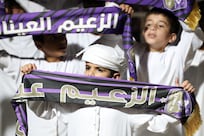analysis
Afshin Molavi
The late British statesman Winston Churchill once noted: "The best way to make history is to write it." The Islamic Republic of Iran has been busy mimicking the advice, writing its own "history" of recent Arab upheavals.
Supreme Leader Ayatollah Ali Khamenei, Iran's most powerful man, praised recent revolts in several Arab countries as "Islamic awakenings" with "Islamic objectives and orientation". President Mahmoud Ahmadinejad said the Egypt and Tunisia uprisings were inspired by Iran's "defiance" against western powers.
And Brigadier General Rahim Yahya-Safavi summed up the sentiment when he said: "The revolution of the people of Tunisia and Egypt is modeled after Iran's Islamic Revolution."
The underlying message here is clear: The government of Iran welcomes the fall of a key Arab adversary, Hosni Mubarak, and the Tunisian Zine El Abedine Ben Ali , but wants to guide the narrative of these revolts into one that will not threaten Iran's own ruling elite.
These "Islamic awakenings", the emerging Islamic Republic party line suggests, recall Iran's own revolt against the Shah of Iran in 1979. And the message to the Iranian people now seems to be: you already had your "Islamic awakening"; the Arab world is simply catching up.
There is just one problem with this line of reasoning: it's not true today, and it wasn't true in 1979, either.
The revolt against the Shah of Iran in 1979 was not merely an amorphous "Islamic awakening," but a wide-ranging protest movement that encompassed a broad spectrum of opposition groups, from social democrats and Islamic Marxists to liberal nationalists and Khomeinist Islamists. It fused together an educated, secular middle class with a newly urbanised traditionalist working class. Its noisy and disparate and clashing voices called alternatively for various shades of democracy, Communism, leftist utopias and Islamist politics (some of which was anti-clerical).
These movements unified under the banner of opposition to the Shah and quickly fractured into a mini civil war after the victory. A reign of terror ensued. Former revolutionary allies turned their guns on each other. Bombs exploded. Insurrections were put down. And ultimately, Ayatollah Khomeini's forces won the post-revolution power struggle.
The 1979 revolt, inaccurately referred to in the global media as "the Islamic Revolution", was no simple "Islamic Awakening". Iranian protesters of the late 1970s chanted: "Death to the Shah, long live freedom."
They did not chant: "Death to the Shah, long live an underperforming, isolated revolutionary state ruled by unelected and corrupt clerics in alliance with a dubiously elected president and a rapacious military establishment with a demonstrated willingness to deploy brute force on its own citizens amid an environment of chronic inflation and economic woes."
Not a very catchy or persuasive chant, but it accurately describes the Islamic Republic that has emerged today.
As for today's Arab upheavals, Iran's leaders would do well to visit Sidi Bouzid, the hometown of Mohamed Bouazizi, the Tunisian vegetable seller who lit himself on fire after a series of repeated indignities at the hands of rapacious municipal officials.
Mohamed Bouazizi wanted one thing: dignity. The dignity of reaping the fruits of one's labour, the dignity of basic rights against a government that constantly tries to "shake you down" for a bribe, and the dignity of having a voice in the future of your country. Bouazizi's dramatic act of self-immolation sparked a fire in the Arab world that will continue to burn and simmer as long as the dignity gap grows.
Political or religious ideologues are often busy writing grand narratives or instantly rewriting history, but the Mohamed Bouazizis of the world are busy simply trying to attain basic human dignity, holding on to their jobs and feeding their families.
There are plenty of Mohamed Bouazizis in Iran: young and middle-aged men and women, whether vegetable seller or software engineer, homemaker or businessman, who are frustrated, angry, yearning for a break, crowded by a government that puts obstacles in their way rather than empowering them, suffering the indignities of chronic unemployment, underemployment, and a deteriorating economy.
Add to this the deep and festering wounds from the post-2009 election crisis, the images of state authorities beating, jailing, and killing Green Movement protestors, and the sense of siege felt by many Iranians arising from sanctions, bad government management, and predatory rule. There remain embers in Iran, simmering, and the Mohamed Bouazizis of Iran are burning.
Former lions of the 1979 revolution and architects of the Islamic Republic like Mir Houssein Mousavi and Mehdi Karroubi are confined to house arrest. Parliament members have called for them to be executed.
With a troubled economy, increasing isolation, a restive populace and deep political cleavages, Iran's experiment is hardly a "model" worthy of emulation. As Egyptians and Tunisian and other Arabs strive for the dignity they deserve, Iranians will continue their own struggle.
The former Chinese Premier Zhou Enlai famously replied to a question by Henry Kissinger about the effects of the French Revolution on world history by saying: "It is still too early to tell."
While the history of Egypt and Tunisia's revolts are certainly still too early to write, Iran's 1979 revolt against the Shah may still have a few acts to play.
Afshin Molavi is a senior fellow at the New America Foundation in Washington, DC, and the author of the Soul of Iran




